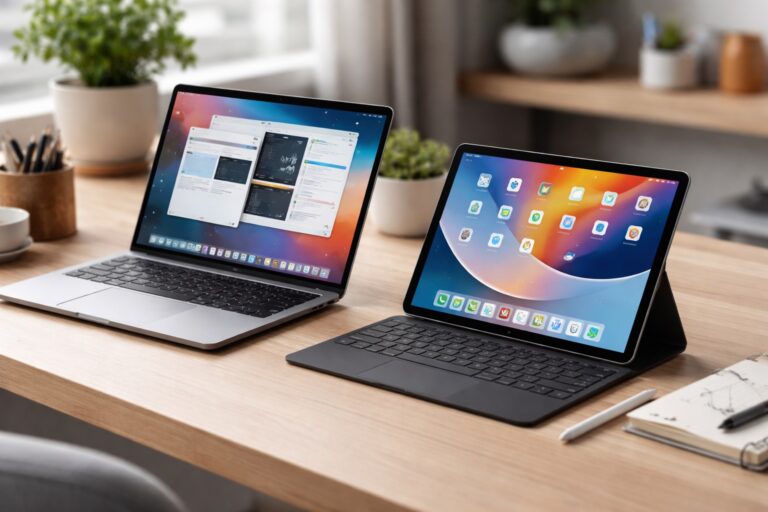In an era where smartphones have become an extension of our bodies, knowing how to choose the right phone and the ideal model is almost like deciding on a new travel companion. Whether it’s for work, study, entertainment, or simply staying connected with the people you care about, the device is always in your pocket.
With the endless options available on the market, making this decision can be as tricky as choosing a pizza flavor on a Friday night with friends. But don’t worry! If you’re thinking about changing your phone, this article is your lifesaver.
First of all, it’s important to understand that there is no such thing as “the best phone,” but rather the phone that’s best for you. So, take a deep breath and get ready to dive into the world of smartphones with a sharp and critical eye.
Android vs. iOS
When it comes to mobile operating systems, it’s like talking about soccer: everyone has their favorite and defends it passionately. In the smartphone universe, two teams compete for users’ attention: Android and iOS.
Android, powered by Google, is known for its flexibility. It’s like a chameleon, adapting to different devices and allowing customization that appeals to everyone, from those who want a simple phone to tech enthusiasts who want to control every pixel on the screen.
In addition, Android offers a huge variety of devices and price ranges, which is great for those who don’t want to spend too much or are looking for something very specific.
On the other hand, iOS, the conductor behind Apple’s iPhones, is all about consistency and simplicity. If you don’t want the hassle of configuring your phone and you’re looking for an ecosystem where everything “just works” smoothly and seamlessly, iOS might be your best friend.
iPhones are known for their build quality, powerful cameras, and a system that receives frequent and simultaneous updates, keeping all brand devices aligned.
Tips on How to Choose a Smartphone
Choosing the ideal phone can be a complex task with so many options available. Therefore, check out these essential tips to help you find a smartphone that meets your needs without complications:
1. Identify Your Needs
Primary Use: Ask yourself what’s most important to you. If it’s photography, look for a phone with good cameras. If it’s gaming or watching videos, screen quality, size, and a powerful processor should be your priority.
For daily use and social media, a mid-range model may be more than enough.
2. How to Choose a Phone: Operating System
Android or iOS: The choice between Android and iOS can affect your user experience. Android offers more customization and a wider range of devices and prices. iOS, on the other hand, is known for its simplicity, security, and integration with other Apple products.
3. Evaluate the Hardware
Processor, RAM, and Storage: A fast processor and a good amount of RAM ensure that the phone runs smoothly, especially important for games and heavy apps.
Storage is crucial for those who keep many files, and not all phones allow expansion with a memory card.
4. How to Choose a Phone: Camera Quality
Not Just Megapixels: Camera quality doesn’t depend solely on megapixels. Also check the lens aperture (the lower the number, the more light it captures), optical stabilization, and additional features like night mode and artificial intelligence.
5. Check Battery Life
Capacity and Power Management: Make sure the phone has a battery capacity that lasts at least an entire day of use. User reviews and online battery tests can give you an idea of real-life performance.
6. How to Choose a Phone: Design and Ergonomics
Appearance and Comfort: The design of your phone is more than just aesthetics; it affects how you use it every day. Larger smartphones may offer better screens for media and games, but they can be uncomfortable to hold or may not fit in your pocket.
Additionally, materials like glass and metal can provide a more premium feel but may also make the device more fragile and slippery.
7. Research the Brand and After-Sales Support
Reliability and Assistance: Before deciding on a model, consider the brand’s reputation and the quality of its customer support.
A phone may have top-notch specs, but if the brand has a history of poor software updates or bad customer service, your long-term experience may be affected.
8. How to Choose a Phone: Extra Features
Additional Features: Some smartphones come with extra features that can be very useful, such as water resistance, wireless charging, 5G connectivity, or even included accessories like headphones or cases.
Think about whether these features justify a possible price increase and if they will truly be useful in your daily life.
9. Think About the Future
Updates and Longevity: Check if the phone you’re considering is known for receiving regular software updates. A device that stays updated with the latest operating system versions is safer and tends to offer a longer-lasting user experience.
Also, consider its resale value in the future; certain brands and models hold their value better over time.
10. How to Choose a Phone: Test Before Buying
Hands-On Experience: If possible, try the phone in person before making the purchase. This can give you a better idea of the screen quality, camera performance, system responsiveness, and the device’s ergonomics.
Additionally, some stores and carriers offer trial periods or return policies that let you use the device for a few days before making a final commitment.
Each of these aspects should be carefully evaluated to ensure your choice is the right one. This way, you’ll have a technological companion that not only meets your current needs but also stays by your side as your requirements evolve.
Remember, the “ideal phone” is the one that fits your lifestyle and meets your expectations. You don’t need the newest or the most expensive model—just one that efficiently handles your everyday needs.



